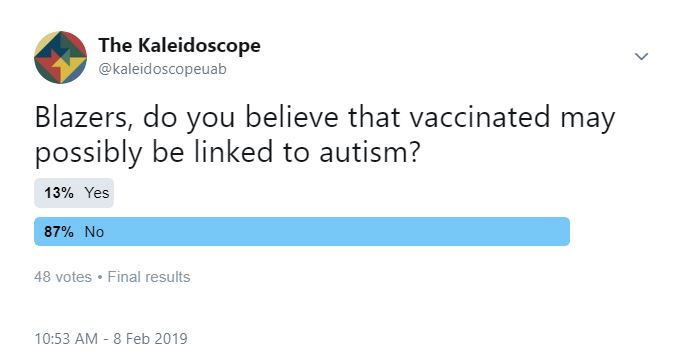-
Measles outbreak raises discussion on vaccination
Measles outbreak raises discussion on vaccination
Allison Brown
CityLifestyle Reporter
browna17@uab.edu
According to Centers for Disease Control and Prevention (CDC), 10 states have reported cases of measles so far in 2019. There have been three in Georgia, all in the Atlanta area. New York and Washington have also declared a state of emergency due to the measles outbreak.Mayo Clinic defines measles as a childhood infection caused by a virus. Measles can be serious and even fatal for small children.
The CDC declared measles eliminated from the United States in 2000. The organization credits this to a successful vaccination program. However, numbers have risen again, and the number of measles cases tripled between 2017 and 2018, CDC website.
“It’s sad because it’s so predictable,” said David Kimberlin, M.D., Co-division director in pediatric infectious diseases.
According to Kimberlin, there are many misconceptions surrounding vaccinations.
“Vaccines do not cause autism,” Kimberlin said. “All reasons supporting these claims have been disproven. It’s like whack-a-mole, you knock one [theory] down, and another pops up.”
In response to the recent outbreaks, a new law being pushed on the federal level has been proposed that will require everyone to receive certain vaccines regardless of personal or philosophical reasons according to the American Council of Science and Health.
Alabama is one of the 18 states that exempt students from receiving vaccinations for these reasons. All parents have to do is sign a waiver.
Julia Homola, a sophomore in immunology, said that she noticed the anti-vaccination trend a few years ago when she was in high school. According to Homola, her high school located in Chicago, had mumps outbreak due to lack of vaccination. Four to seven people were infected Homola said.
“They told anyone who wasn’t vaccinated to stay home for six weeks,” Homola said.
To ensure all faculty and staff on campus are protected, UAB requires students to receive two doses of MMR vaccine (for measles, mumps and rubella), a tetanus vaccine, varicella vaccine (for chickenpox or shingles), a meningococcal vaccine and tuberculosis screening, according to Carol Griggs, practice manager for the student health services.
Griggs said that UAB’s immunization policy only allows medical exemptions. This means students cannot be exempted because of their religious or philosophical beliefs.
It is those who are not vaccinated, or who choose to not vaccinate their children, who are at risk.
Kimberlin said that those who are unvaccinated will eventually be affected.
“[Measles] will find the dry leaves, if you will, and start a fire,” Kimberlin said.
-
Study to analyze the causes of low physical activity among older African-Americans
 Assistant professor Pamela Bowen, Ph.D., is the spearhead of the study. (Photo from UAB News)Tessa Case - News Editor
Assistant professor Pamela Bowen, Ph.D., is the spearhead of the study. (Photo from UAB News)Tessa Case - News Editor
news@insideuab.com
A new study led by UAB assistant professor Pamela Bowen, Ph.D., seeks to understand the reason behind the low level of physical activity amongst older African-Americans in hopes of alleviating it.
